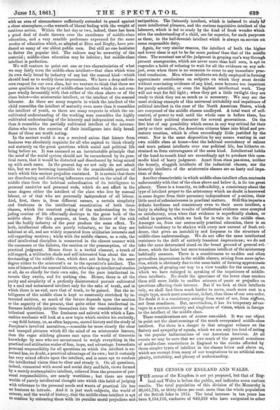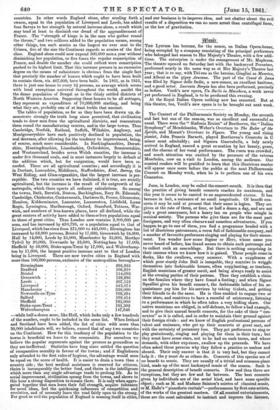THE CENSUS OF ENGLAND AND WALES.
Tat census of the Kingdom is not yet prepared, but that of Eng. I. land and Wales is before the public, and indicates some curious results. The total population of this division of the Monarchy is 20,061,725, or thirty-three per cent. more than the whole population of the British Isles in 1815. The total increase in ten years has been 2,134,116, exclusive of 640,210 who have emigrated to other countries. In other words England alone, after sending forth a swarm, equal to the population of Liverpool and Leeds, has added four Savoys to her strength by natural increase alone, a result which may tend at least to diminish our dread of the aggrandisement of France. ,The "strength of kings is in the men who gather round the throne," and two millions added to the population means, among other things, ten such armies as the largest we ever sent to the Crimea, five of the size the Confluent regards as armies of the first class. England alone could now expend 200,000 men a year without diminishing her population, or five times the regular conscription of France, and double the number she could collect were conscription pushed to its highest limit. That this increase presses in no excessive degree on the means of subsistence is obvious from the single fact that precisely the number of houses which ought to have been built to contain them, viz. 467,000, have been built. In 1861, as in 1851, there is just one house to every 51 persons, an average which seems with local exceptions universal throughout the world, amidst the the dense population of Bengal as in the thinly settled districts of North Western America. Supposing these houses to be all cottages, they represent an expenditure of 70,000,000 sterling, and being what they are, probably one of at least treble that amount.
The tables of population, so far as they have been drawn up, de- monstrate strongly the truth long since perceived, that civilization tends to draw men from the agricultural districts, and concentrate them round the manufacturing centres, and in the large towns. Thus Cambridge, Norfolk, Rutland, Suffolk, Wiltshire, Anglesey, and Montgomeryshire have each positively declined in population, the real decrease, after allowing for the tendency to improvement, being, of course, much more considerable. In Buckinghamshire, Dorset- shire, Huntingdonshire, Lincolnshire, Oxfordshire, 'Somersetshire, and Westmoreland, besides seven Welsh counties, the increase is under five thousand souls, and in most instances largely in default of the addition which, but for emigration, would have been re- corded. These are all agricultural counties ; and accordingly it is in Durham, Lancashire, Middlesex, Staffordshire, Rent, Surrey, the West Riding, and Glam organshire, that the largest increase is per- ceptible. The two counties we have italicized, it is true, are strictly agricultural, but the increase is the result of the outgrowth of the metropolis, which there upsets all ordinary calculations. So among the towns, Bath, Berwick, Boston, Buckingham, Bury St. Edmunds, Cambridge, Chichester, Cockermouth, Dartmouth, Frome, Gloucester, Honiton, Kidderminster, Lancaster, Launceston, Lichfield, Lyme Regis, Lymington, Marlborough, Oxford, Stamford, Totness, War- wick, and numbers of less-known places, have all declined, while the great centres of activity have added to themselves populations equal to those of great cities. Thus London now contains 2,800,000 per- sons, and has increased by 430,798, or a population equal to that of Liverpool, which has risen from 375,000.to 443,000 ; Birmingham has increased by 63,000 persons, Bristol by 17,000, Greenwich by 34,000, Hull by 14,000, Leeds by 35,000, Manchester by 35,000, Merthyr Tydvil by 20,000, Newcastle by 22,000, Nottingham by 17,000, Sheffield by 50,000, Stoke-upon-Trent by 17,000, and Wolverhamp- ton by 11,000, the largest positive increase next to that of London being in Liverpool. There are now twelve cities in England with more than 100,000 persons, exclusive of the metropolitan boroughs—
Birmingham
• •
295,955 Bradford .
•
106,218 Bristol
154,093 Greenwich .
139,286 Leeds .
207,153 Liverpool . .
443,874 Manchester . . . 338,000 Newcastle-on-Tyne . 109,294 Salford . . . 102,414 Sheffield . . . 185,000 Stoke-upon-Trent . . . 101,302 Wolverhampton . . . . . . 147,616
—while half-a-dozen more, like Hull, which lacks only a few hundreds of the number, ought to be included in the same list. When Ireland and Scotland have been added, the list of cities with more than 30,000 inhabitants will, we believe, exceed that of any two countries on the Continent. How far this tenancy of the population to the towns is beneficial we leave to the economists. For ourselves we believe the popular arguments aminst the process as groundless as they are ineffectual. Statistics have long since settled the question of comparative morality in favour of the towns ; and if Englishmen only attended to the first rules of hygiene, the advantage would soon be equal on the score of health. It is easier to drain a town than a country side ; the best medical assistance is reserved for citizens, theirs is incomparably the better food, and theirs is the intelligence which more than any single advantage tends to prolong life. As to social improvement, civilization sprang from the towns, and shows to this hour a strong disposition to remain there. It is only when aggre- gated together that men learn their full strength, acquire tolerance for novel ideas, feel the quickening influences of competition and emulation, and of necessity leave the road fairly open to the strong. For good or evil the population of England is massing itself in cities, and our business is to improve them, and not chatter about the evil results of a disposition we can no more arrest than centrifugal force, or the law of gravitation.































 Previous page
Previous page